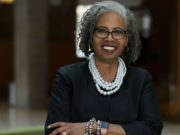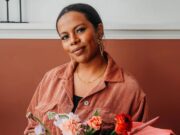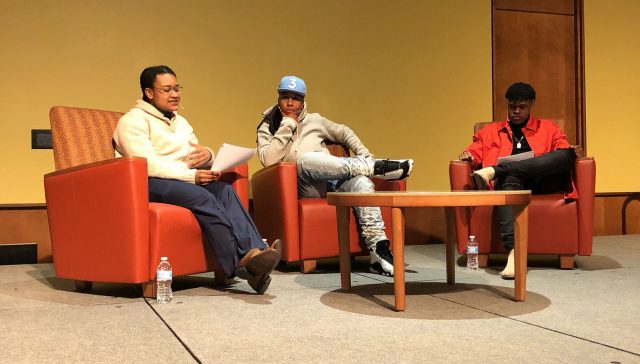Last Tuesday Emmy Award Winning writer Lena Waithe spoke to University of Wisconsin-Madison students at Union South’s Varsity Hall about the significance of “otherness” in popular culture and shared her experiences as a queer Black woman in the entertainment industry.
The Southside Chicago native came to Wisconsin for her first time to participate in a Q&A event featured in the university’s 2018 Black History Month observation, titled Reclaiming Blackness: An Act of Resistance and Resilience. The month’s planning committee chose this theme on account of Blackness being “crafted at the hands of dominant culture,” said one of the evening’s moderators.
Waithe, who is well known for her Showtime program “The Chi,” is the first Black woman to earn an Emmy for comedy writing for her work in co-writing the “Thanksgiving” episode of Aziz Ansari’s Netflix series “Master of None.” The episode has racked up a lot of praise for following the coming-out story of story the character Denise, which mirrors Waithe’s own story. The budding producer’s body of work also includes titles like ‘Dear White People’ and ‘Step Sisters.’
The audience roared in excitement as Waithe finally poked her head out of the doors facing the room as she was being introduced. She wore a ‘Chance 3’ hat and shouted out other Chicagoans in the room as she joked about how the cold weather in Madison reminded her of home.
On stage with Waithe, moderating the event, were students Nia Scott and Marquise Mays, who are co-editors of The Black Voice, an online magazine for Black students at UW-Madison. Questions posed to Waithe were primarily centered on matters of identity.
When asked how she reclaims her own Blackness, Waithe responded, “I don’t know if my Blackness needs to be reclaimed.”
“I grew up in a house where I was very proud,” she said. “I grew up in a house where we painted the angels on top of the tree black.”
Waithe explained to the crowd of nearly 800 guests that she credits her success to being true to herself in all of her work and by treating her Blackness, queerness and womanness like her superpowers.
She also pointed to literary legends as a sources of inspiration and guidance, “I try to walk in the way that Lorraine, Baldwin, Langston, Zora, in the way they taught us. We’re all their sons; we’re all their daughters; they told their truths,” she said.
However, with gaining more attention in regards to her Emmy and up-and-coming programs such as ‘The Chi’ and ‘Twenties,’ the writer shared that it is difficult escaping being the “poster-child” for her race but she still carries the burden of honoring her race at the same time.
“I can’t deny any part of myself because it would be disrespectful to those that fought to stay alive to get here,” she said. “Again our crowns have been paid for in free labor.”
Waithe spoke of the complexities of being a creative in a “sea of white,” and having her “otherness” admired and commodified by the entertainment industry.
“The only color Hollywood cares about is green…For them it’s about commerce and the truth is the color of our skin has always been about commerce,”she said as the audience snapped in response.
The Q&A event allowed for Waithe to open up to the UW-Madison community and share her journey to success with other young aspiring Black creatives. Many audience members, fans, and writers were given the opportunity to ask her questions directly.
After one guest asked for Waithe to read their script, she responded that she intends to act as a mentor and help others achieve their goals. She offered the playwright to have their work looked over by her assistant in hopes of helping them perfect their work before she reads the script.
Waithe’s dedication to honoring her past, her elders, staying true to herself, and paying it forward to others hoping to succeed led to an honest discussion that moved the audience of students, staff, faculty and community to laughter and snaps that filled Varsity Hall.




























